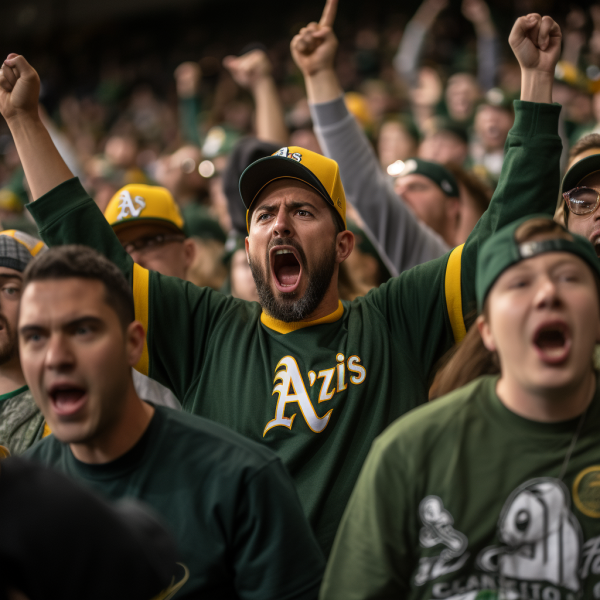Hollywood director joins Oakland A’s fans in asking John Fisher to sell

Ryan Fleck is a screenwriter/director whose credits include Captain Marvel, Half Nelson, and Sugar, a baseball film. He won an Emmy for his work on ESPN’s 30 for 30 documentary series about the 1989 World Series. His most recent film, Freaky Tales, was shot entirely in the Bay Area and will be released in 2024.
My first visit to an A’s game was in 1982. My summer day camp organized a field trip to the Coliseum via BART for all of us kids. I could see the Oakland hills beyond the outfield ice plants and bleachers from the third deck where we sat.
Because I was five, my attention was frequently drawn away from the action on the field. The vendors were shouting “popcorn here!” and throwing peanuts. Actual cash bills were being handed out to strangers, who then passed the money on to the strangers next to them. In exchange, I received a cardboard cup of ice cream with a small wooden stick. It was incredible!
It didn’t matter that I didn’t understand baseball at the time. When a guy named Rickey arrived on base, everyone jumped to their feet. I knew stealing was bad in the real world, but when Rickey stole, we cheered. Rickey stole 130 bases that season (an incredible feat that will never be repeated, even with larger bases!).
Back in elementary school, some kids on the playground would jump off the swings with their arms outstretched, claiming to be Superman. My friends and I performed the same maneuver, but we pretended to be Rickey as we dove headfirst into the sand below.
My father told me Rickey Henderson grew up in Oakland a few years later, at another A’s game. I was curious if all of the players represented their hometowns. They didn’t, of course.
Curt Flood was another Oakland baseball player. He refused to be traded by the Cardinals to the Phillies in 1969, stating, “After twelve years in the Major Leagues, I do not feel I am a piece of property to be bought and sold irrespective of my wishes.” So Curt Flood allowed free agency, taking power away from the owners and giving players some say over where they play. Oaklanders are often allergic to injustice.
The Black Panthers began in Oakland as a self-defense movement against police brutality. In 2001, Oakland Congresswoman Barbara Lee was the lone vote against authorizing military force in Afghanistan (a courageous stance that has stood the test of time).
Bill Russell, an NBA legend, was born in Oakland. He attended the same high school as Curt Flood. Clint Eastwood is also an Oakland native. For decades, the leading man lit up movie screens as tough guys who reveled in crushing outcasts. Bruce Lee was not a native of Oakland. However, his first public martial arts studio was only a few blocks away from Clint Eastwood’s high school.
Tom Hanks was born in Oakland. I had the pleasure of working with him on my most recent film, which we shot in Oakland. In the film, he is described as a guy who used to sell hot dogs at A’s games. This was incorrect, according to Tom. At A’s games, he used to sell soda. On hot days, they were sticky and difficult to manage. Only the top vendors were allowed to sell hot dogs because they were easy to handle and brought in the most money. I didn’t change the phrase because “hot dogs” sounded more appealing than “sodas.”
I’m also from Oakland. On May 1, 1991, I skipped school to witness Rickey Henderson break Lou Brock’s all-time stolen base record. I was a freshman in high school when I received Saturday detention.
After noticing my otherwise perfect attendance, the vice principal asked if it was worth it for a baseball game. I assured him that it was. Sure, he was correct that the game was just that. Any baseball fan will tell you that it’s much more.
On the field, there were legends with names like Catfish, Fingers, and Blue. The Bash Brothers were a charismatic duo. Reggie, Rickey, and Stew are all one-name wonders (Dave Stewart is also from Oakland).
Baseball fans, like Oakland, are a proud community-resilient, obstinately loyal, and unwilling to give up without a fight. The Coliseum is our flawed palace for celebration and commiseration (some fans refer to it as “the last dive bar”). And, dare I say it, some genuine emotional bonding.
My divorced parents and I would spend afternoons and evenings at the Coliseum cheering on our A’s while also catching up on life. “How’s Aunt Nancy’s knee?” “Hey, remember that time when we got lost in Chaco Canyon and the ranger had to hike out to find Ayda?” “Hold on-Canseco’s up and needs a triple for the cycle.” “Did you happen to hear Sam has cancer?” “Let’s. Go. Oak. Land!” says the narrator. “Happy Mothers’ Day.” “Let’s. Go. Oak. Land!” says the narrator. “Happy birthday.” “Let’s. Go. Oak. Land!” says the narrator.
The A’s current owner, John Fisher, has announced that the team will relocate to Las Vegas. (I just puked in my mouth as I wrote that sentence.) He claims that the A’s low attendance demonstrates that there is no fan support for the team in Oakland. But Oakland is having none of it.
Remember your aversion to injustice? Oakland knows when it smells a rat (both in our stadium and in our business). In 1990 (the year after winning the World Series), the A’s average attendance was over 35,000 per game, trailing only the Blue Jays and Dodgers. And, while the view from the third deck was still lovely, I assure you that we were not there to watch the sunset.
Former owner Walter Haas and the A’s management put together a fantastic team, and the fans came out in force to support them and our city. Contrast that with Fisher’s purge of every fan-favorite player (many of whom are now All-Stars on different teams), while the current roster has the potential to lose more games than any team in the game’s history.
Oh, and he doubled the ticket prices in case any lingering fans wanted to attend games to, you know, spend time with their families. “I’m sorry, Dad, but it’s just not worth it any longer.” We’ll just talk on the phone instead of handing over our hard-earned cash to some trust-fund billionaire who doesn’t give a damn about our town.”
Appeals to a billionaire’s sentimental nostalgia, family values, and civic pride may be a losing strategy. Perhaps hoping that at least eight other owners will hear Oakland’s agonized cries and vote against the Vegas move is as naive as believing that all baseball players play for their home teams.
I did, however, write a film about a half-alien woman who shoots fire from her fists and flies through space without a mask, so I’m not afraid to dream big.
We know there are some powerful people who would love to relieve Fisher of his ownership responsibilities if he ever decides to sell and make a lot of money on his way out. Reggie Jackson, Bill Gates, Joe Lacob, and Dave Stewart have all expressed an interest. And I’ve had private conversations (well, private until now) with Tom Hanks and Ryan Reynolds, both of whom would gladly contribute if that day ever came.
John Fisher could have been (and still could be) the hero of this story. Instead, he appears to be content with playing the villain–and not a charismatic Joker-esque villain with complex motivations and a trippy laugh.
The guy is simply greedy. In a comic book or film, a greedy bad guy is just pathetic and boring. In real life, however, a greedy dirtbag can wreck havoc on real communities, real people, and real hearts. Las Vegas, be careful. Sports fans everywhere, keep your heads up. I saw a young Rickey Henderson on his way to becoming the greatest base stealer of all time at my first A’s game in 1982. If John Fisher follows through on his threat to take our A’s to Nevada, he will be remembered as The Town’s ultimate two-bit thief.
But, A’s or no A’s, Oakland isn’t going down without a fight.
Let’s go to Oak Land! Let’s go to Oak Land!






